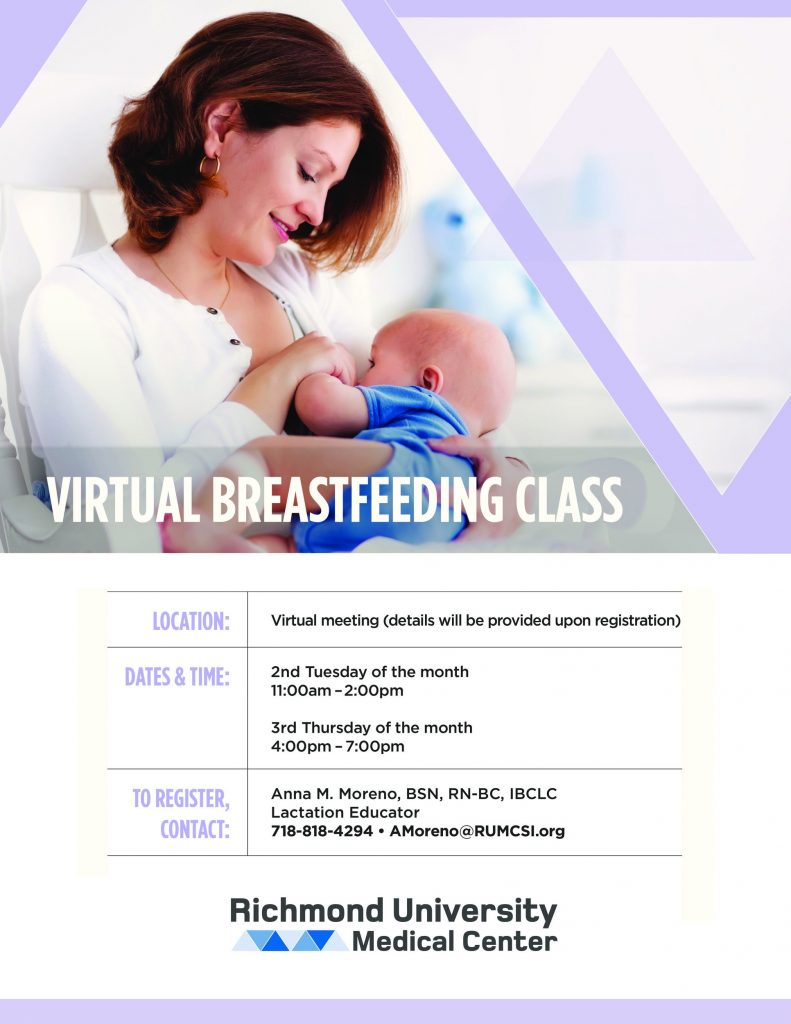Maternity and Childbirth Services
Pregnancy and childbirth are special times, requiring caring hands. At Richmond University Medical Center, we are proud to be here for you and to help you welcome your new family member.
Maternity
Richmond University Medical Center provides advanced health care in a relaxed and compassionate manner for the women of Staten Island. We deliver approximately 3,000 babies each year, and our nurses have won the Johnson & Johnson Award for several years in a row. Our maternity suites offer superior accommodations for new mothers and their families. Our caring staff will make birthing your baby and the first bonding moments an experience you’ll always cherish, set in an environment you will truly enjoy.
Our recently renovated rooms include new, state-of-the-art beds, refrigerators, reclining chairs, private bathrooms, and accommodations for the new father, all for a nominal fee.
Click here for important maternal warning signs that may require advanced care. If you have any of these symptoms during or after pregnancy, contact your health care provider and get help right away.
Newborn services

With 40 bassinets, we care for 3,000 newborns annually. There are approximately 600 annual admissions to our highly acclaimed Neonatal Intensive Care Unit (NICU), and we register a survival rate of 997.2 out of every 1,000 births. We are able to save babies weighing as little as 1.5 pounds. You can be confident that we’ll take the best care of you and your baby.
If you or someone you love is considered high-risk, you’ll be more secure knowing that our Center for Maternal/Fetal Medicine, under the direction of Michael Cabbad, M.D., is staffed by high-risk prenatal specialists who manage pregnancies where diabetes, hypertension, or genetic complications are factors. We take expert care of high-risk expectant mothers and their newborns. We also offer a maternity unit where high-risk mothers-to-be experiencing problems near the end of pregnancy can be safely stabilized.
The center also assists couples who are immunologically incompatible, which could prevent the mother from carrying the pregnancy to term. Couples experiencing recurrent pregnancy loss are also served at our center. We offer 3-D ultrasound, which helps foster maternal-fetal bonding and can lead to earlier detection of fetal abnormalities. Ultrasounds also give our fetal medicine specialists a “live” view of the fetus so they can better analyze fetal development.
At RUMC, we provide comprehensive care to women making decisions regarding their pregnancies. We strive to provide the most advanced healthcare in the most relaxed and compassionate setting. For more information about having your baby delivered here or for a free tour of the Birthing Center, please call (718)-818-4294.
Mothers-to-be Need to be Smart About Medicine

A mother and her unborn child share a vital bond. The fetus absorbs nutrients from its mother. In this same way, an unborn baby can also be exposed to harmful substances, some of which you may be storing in your home medicine cabinet. Not all medications are safe to use while pregnant, and finding reliable information about them isn’t always easy.
Limited Research
Nearly nine out of 10 women in the U.S. take at least one medication while they are pregnant. That includes prescription drugs and over-the-counter (OTC) remedies for common ailments, such as colds, heartburn, and muscle pain. A growing number of women take these medications during the first three months of pregnancy, which is an important time in fetus development.
What might this mean for a baby’s health? Unfortunately, experts aren’t always sure. A few drugs, such as some that treat depression or skin problems, have been found to cause birth defects. Widely used OTC medications also may harm the fetus. Aspirin, for example, may impair fetal blood flow when taken in the last three months of pregnancy.
For many medications, though, safety information for mothers-to-be isn’t well known. This is because before a drug can be sold, the FDA requires the manufacturer to test its safety. As a precaution, these studies typically don’t include pregnant women. Consequently, it isn’t always clear how specific medications may ultimately affect an unborn child.
Reliable Information
Many pregnant women ask their healthcare provider about medication use before and after childbirth, which is the best source of reliable information on drug safety. However, according to a recent survey, 60 percent of women worldwide also scour the Internet for information. Unfortunately, these search results may be misleading.
In a recent study, researchers performed their own Internet searches for lists of medications safe to use during maternity. They pinpointed 25 sites sharing this information. None of the sites included harmful drugs on their lists. However, many failed to mention how little is actually known about drugs labeled as safe. Researchers concluded that these lists might incorrectly assure women of a medication’s safety.
Always talk with your healthcare provider to find out more information. Expand your knowledge about drug safety during pregnancy with this quiz.
The Best Medication Choice
If you are pregnant or planning to become pregnant, these tips can help you make an informed choice about medication use.
- Always check with your healthcare provider before taking any medications, including those available over the counter.
- Never stop taking a medication without first consulting your healthcare provider. Some pregnant women need certain medications to manage conditions such as diabetes or asthma. In these situations, not using a drug may endanger both mother and baby. With your provider, you can carefully weigh the benefits and risks.
- Avoid herbal or dietary supplements. Like many medications, little is known about how they may affect a mother-to-be or her fetus.
- Read the label. A drug will list any known risks for pregnant women.
- Consult a pregnancy exposure registry. These ongoing studies track how certain medications interact with pregnant women. Find more details here: www.fda.gov/pregnancyregistries
Only a few medications should not be taken during breastfeeding, and sometimes a safe substitute is available. Talk with your doctor or a lactation consultant to discuss breastfeeding and what is best for you and your baby.
- See more at http://provider35.staywellsolutionsonline.com/Library/News/Newsletters/Women/88,P10683#sthash.HvtzhXmT.dpuf
Choosing to breastfeed
Making a decision to breastfeed your baby is a personal matter. Friends and family often offer strong opinions about breastfeeding. Remember, you and your baby are unique, and the decision is yours.
Breast Milk is the Best Milk
Nature designed human milk especially for human babies, and it has many beneficial properties that make it better than formula. Did you know that your milk contains just the right balance of nutrients, and the properties of the milk are easily used by your baby’s immature digestive system? Because your breast milk was developed for your baby, your milk is the most gentle. Medical experts, including the American Academy of Pediatrics and the American College of Obstetricians and Gynecologists, strongly recommend breastfeeding.
What are the Benefits?
- Breast milk provides a perfect mix of vitamins, protein, and fat, everything a baby needs to grow.
- Breast milk is provided in a form that is more easily digested than infant formula.
- Breast milk contains antibodies that help your baby fight off viruses and bacteria.
- Breastfeeding lowers your baby’s risk of having asthma or allergies.
- Babies who are breastfed exclusively for the first six months of life have fewer ear infections, respiratory illnesses, and bouts of diarrhea. They also have fewer trips to the doctor and hospitalizations.
- Breastfeeding has also been associated with higher IQ scores in later childhood.
- The physical closeness and skin-to-skin touching and eye contact after childbirth all help your baby bond with you and feel more secure.
- Breastfed infants are more likely to gain the right amount of weight as they grow, and they are less likely to become overweight children.
- The AAP says that breastfeeding plays a role in the prevention of sudden infant death syndrome.
- Breastfeeding is also connected with a potentially lower risk for diabetes, obesity, and some cancers (but more research is needed).
Mothers also receive benefits from breastfeeding. Breastfeeding burns extra calories, so it can help you lose pregnancy weight. With the release of the hormone oxytocin while breastfeeding, your uterus returns to its pre-pregnancy size faster, which could also help reduce uterine bleeding after birth. Breastfeeding can also help lower a mother’s risk of breast and ovarian cancer.
During the first few days after childbirth, breasts produce colostrum. This first milk is very thin, but it meets all of your baby’s nutritional needs immediately after birth until mature milk develops. Colostrum also helps a newborn’s digestive tract develop and prepare for digestion.

Support for New Mothers
Motherhood can be stressful for new moms. Not only are you healing from labor while being sleep deprived, you now have a new responsibility for a baby. Breastfeeding will become easier after you learn proper techniques for helping your baby latch on. You will also become more confident in your breastfeeding abilities.
If you find that you need help with breastfeeding, and many new moms do, you can get help from a family member, friend, nurse, or physician. You will often find that other women in your life have had the same questions, and they can help you with their experience. Attending a breastfeeding class or attending support groups through the La Leche League can also be helpful. The Richmond University Medication Center offers resources and support through the Lactation Support Center. You can receive consultation services and resources by calling (718)-818-4375.
About Bella Baby Photography Sessions

Richmond University Medical Center is proud to partner with Bella Baby Photography to offer parents the opportunity to capture their baby’s first photographs in a professional, artistic style that can easily be shared with family and friends. Bella Baby brings professional photographers to the hospital to capture your first moments with your baby in the comfort of your hospital room.
Photos are posted to a password protected, online slideshow for you to view shortly after the photo shoot. Online viewing and ordering are available to those with whom you choose to share your password. Moms can order birth announcements or popular packages the same day or wait until they get home.
Visit bellababyphotography.com for more information.



